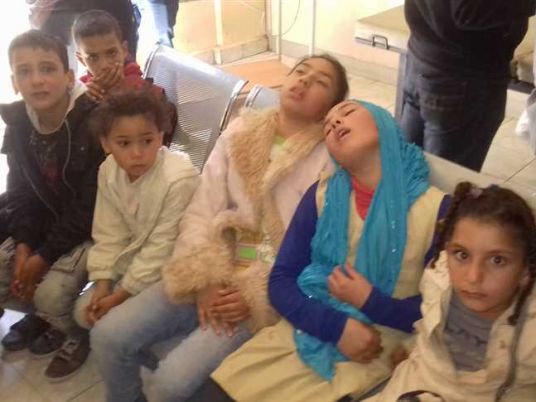Thousands of supporters of Al-Azhar’s top cleric, Grand Sheikh Ahmed al-Tayyeb, took to the streets across Egypt’s governorates after Friday prayers, protesting against what they believe are attempts within the Islamic institution to remove the cleric from his post and Brotherhoodize the institution.
On Wednesday, the Supreme Azhar Council decided to sack Al-Azhar University President Osama al-Abd following a scandalous food poisoning case in the university's dorms, in which 500 students were hospitalized.
The decision came after mounting pressure from Al-Azhar University students, who stormed the offices of Al-Azhar’s top cleric late Tuesday and blocked the road in front of the university's dorms in Nasr City days ago.
The SAC called for the election of a new university president for the first time in the university's history, in accordance with an Al-Azhar law that was passed by the then-ruling military council in early 2012.
The university's president used to be appointed by the president prior to the 2012 Al-Azhar law.
A committee of Al-Azhar scholars met on Thursday to decide on the nomination criteria and the details of the electoral process. Abd's first deputy, Farid Hamada, will be the acting president until a new president is elected.
Students have long complained about deteriorating services inside the university, as well as flagrant financial corruption allegations against Abd and his aides.
"We have a long history with Abd, and food poisoning of such a large number students was the final straw," the head of Al-Azhar University's student union, Ahmed Abdel Rahman al-Bakry, said.
Bakry believes that the food poisoning case reflects institutionalized corruption within the largest Islamic institution in the world, adding that they presented evidence of corruption implicating Tayyeb.
"There were angry calls to oust Tayyeb himself, because in the midst of anger you cannot control the demands of the students. But we were aware that sacking him is a red line. We kept our demands within the realm of sacking Abd and his deputies as well as investigating the corruption inside the university, and our demands were met," claims Bakry, who also belongs to the ruling Muslim Brotherhood group.
The calls to sack Tayyeb are indicative of a political tug of war within the institution, especially after a recent spat between Tayyeb and the Brotherhood.
Observers have been referring to an obvious conflict between two currents within Al-Azhar, as Tayyeb is allegedly facing a growing Brotherhood influence inside Al-Azhar.
Al-Azhar's rejection of the Islamic bonds law brokered by the Brotherhood-dominated Shura Council, as well as the recent sidelining of the Brotherhood's candidate during the elections of the country's grand mufti are seen as strong signs of a serious divide.
The remarks by leading Brotherhood figures relating to the current food poisoning issue have led to ongoing speculations that the ruling Islamist group is politically using the issue to better tighten its grip over Al-Azhar.
The Brotherhood's Freedom and Justice Party leader Mohamed al-Beltagy, on his official Facebook page, describing the protests as "an honorable example of the success of peaceful protesting for a noble cause," while disregarding the storming of Al-Azhar’s clerical offices.
"The people want the president to end corruption, without ousting those who were appointed by Mubarak in leading positions. Whenever the president attempts to do this they say Brotherhoodization," Beltagy said in another post relating to Al-Azhar incident.
Bakry denies any attempt at “Brotherhoodization,” arguing current student protests were extremely authentic and spontaneous.
"If it was planned to be politicized, Tayyeb would have never given in to our demands. He knows of the corrupt leaders within the institution," he added.
Internal Azhar spats and the future
Researcher of religious freedoms at the Egyptian Initiative for Personal Rights Amr Ezzat argues that there is a deeply rooted rift between the student movement at Al-Azhar and the leadership.
"The escalation of the protest movement has its old origins. Independent groups within the university have long called for ousting Tayyeb for his affiliation with the Mubarak regime," he said.
Ezzat added that the Brotherhood movement, which swept the current student union elections, has always kept itself away from these demands.
"That's why the escalation has never been that strong against Al-Azhar leadership," he added.
The current Brotherhood-Tayyeb spat was raised to the surface, according to Ezzat, when the recent Al-Azhar law was passed.
The then-military junta passed the law just days before the first post-uprising elected Parliament was inaugurated. It stipulates that the Al-Azhar grand sheikh appoints the supreme council’s members, who are then entitled to elect the grand sheikh and the mufti, as well as to make decisions on all issues pertaining to the institution.
The dissolved Parliament, dominated by the Brotherhood and Salafis, was angered by the law and the way by which it was passed, but never challenged it.
"The student movement uprising is very radical; The Salafis are also radicalizing against Tayyeb, demanding that their ultra-conservative brand of discourse be better heard inside Al-Azhar; the Brotherhood has its own interest in dominating Al-Azhar. All will lead to an escalating situation in the future," he added.
But current attempts to sack Al-Azhar’s top cleric is cause for alarm for Ezzat.
"All these heated speculations that the Brotherhood hopes to dominate the institution will lead independent Azhar scholars, who long opposed Tayyeb, to support him," he explained.
Sheikh Abdel Moaty Ibrahim, coordinator of the group independent Azharis Without Borders, agrees.
"We have opposed Tayyeb for his affiliation with the old regime, but we are siding with him, especially after the food poisoning issue, because we do believe that the issue has been heavily politicized," he said.
The independent Azhar scholar believes that the student movement is genuine in calls against Abd.
"We have long criticized the current Azhar leadership of mismanagement, and we know they are complicit in this food poisoning issue, but using the anger of the students to get rid of Tayyeb is unacceptable by the Brotherhood," he added.
Ibrahim stipulates that all independent scholars are left with nothing but to support Tayyeb.
"As long as the threat of the Brotherhood is strong, as long as there is no real independence of Al-Azhar from the executive authority, and as long as there are no real alternatives that can replace both the former regime and the Brotherhood, we will keep supporting Tayyeb. At least, until the Azhar law is better formulated to allow us to elect the grand sheikh more democratically," Ibrahim asserted.
Ezzat believes that the current spat is expected to continue as long as Al-Azhar is set to be part of the political game.
"Al-Azhar is not independent, it is just a symbolic gesture in the constitution. The president has to approve the formation of the Supreme Scholars Council, as well as the selection of the grand mufti and the grand shiekh. Azhar-related laws are still in the hands of the Parliament, while they should be internally drafted by Al-Azhar," Ezzat explained.
"As long as these issues remain in place, the current rift will continue to take place, and the spat over power will continue," he concludes.


